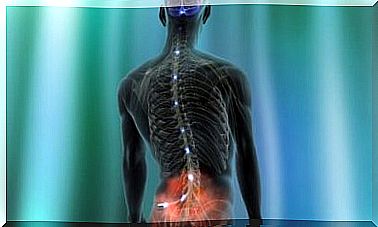Sleep Inertia: Why Do You Wake Up Dazed And In A Bad Mood

Do you know what “sleep inertia” is? Many people feel tired when getting up, despite having slept the amount of hours recommended by experts. They cannot think clearly and feel dizzy. It seems that they were suddenly possessed by annoyance and bad temper.
Far from being a strange symptom, science began to disseminate data on this phenomenon in the 1960s. It is a temporary state of reduced cognitive capacity and alertness.
This state usually lasts about an hour after a person wakes up. However, this period varies from case to case; in some people it lasts approximately fifteen minutes, and in others an hour or even longer. Duration is believed to be related to the sleep phase that was interrupted.
What characterizes sleep inertia?

This lapse of dizziness and moodiness after sleep is characterized by a marked reduction in the typical awake state of alertness. There is a big increase in drowsiness and a big drop in brain output.
Likewise, there are irritability, intolerance, bad mood and even states of depression. Sleep inertia may be accompanied by general disorientation or confusion.
It is a phenomenon that interferes with normal physical or mental tasks and causes a decrease in response time, poor short-term memory and slow thinking. It’s something like a jetlag .
Lightheadedness and moodiness upon waking: a medical issue
Contrary to what many people believe, feeling confused and moody when getting up is a medical issue, not a matter of character or personality. In fact, the American Academy of Sleep Medicine has included the status of sleep inertia in the list of parasomnias, that is, sleep disorders.
Sleep inertia affects adults and adolescents without distinction. Therefore, its origin cannot be explained by the age of those who suffer from it. Instead, it could be an issue linked to modern life, which has distanced itself from natural cycles and does not respect the circadian rhythms of sleep.
Circadian rhythms are those physical, mental and behavioral changes that follow a daily cycle, in direct relation to light and dark. There are theories that support the disruption of the natural cycle of waking up at sunrise and sleeping with the company of artificial lights such as television has affected our sleep.
During sleep inertia, the brain performs activities typical of deep sleep phases. Thus, some studies propose this relationship between circadian rhythms and sleep inertia, as it would explain its presence in the fact of having awakened the brain during the restful sleep phase, as marked by the biological clock.
Data to be considered

While sleep inertia seems harmless enough, the confused state and bad mood of those who suffer from it can have consequences. Scientific studies have shown that if sleep is interrupted during a deep phase, the brain’s performance can drop dramatically.
This low brain performance, slow responses to everyday situations and the difficulty in overcoming sleepiness can bring risks in certain professions. Workers who have to work shifts and take “naps” expose themselves to abruptly interrupting their sleep and experiencing inertia, which can pose a risk to others.
Although effective ways to prevent sleep inertia and thus avoid dizziness and moodiness upon awakening have not been found, it is advisable to maintain strict sleep hygiene.
This hygiene includes, among other measures, sleeping between seven and eight hours a night without interruption, avoiding televisions or computers in the bedroom, maintaining a routine and avoiding the consumption of stimulants before bed.









